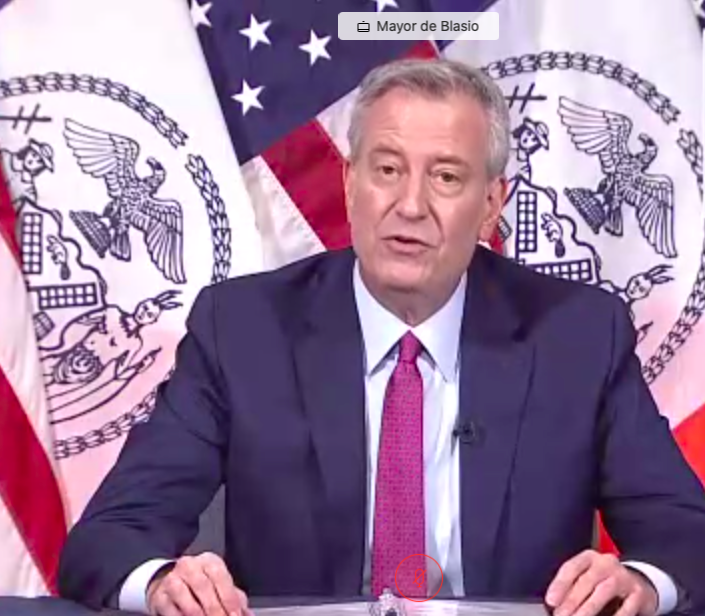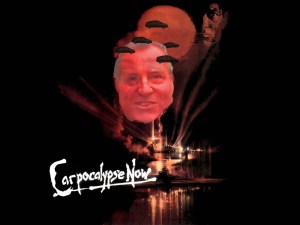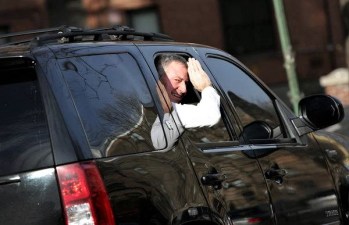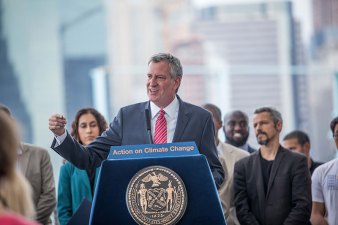YOU’RE WELCOME: Mayor de Blasio Agrees that Transportation Planning IS Important

The de Blasio administration has bolstered its list of post-COVID “recovery panels” to include a task force on transportation — with the mayor saying his goal is to move New York City “away from so much dependence on cars.”
Mayor de Blasio was widely criticized (and not just on Streetsblog!) for ignoring transportation when identified eight sectors of the economy — such as retail businesses, cultural institutions, public health, etc. — that would need substantial planning as the economy eventually reopens.

Indeed, transportation issues — such as mitigating the influx of car traffic and danger as people initially shun transit — will be central to planning the post-COVID city.
On Wednesday, the mayor agreed (and even thanked Streetsblog for pushing him on the issue). In his daily press conference, we asked him to explain his thinking now that “surface transportation” had gotten its own panel.
You raised a couple of good points about what it is going to mean for the future to come back differently in this city in terms of transportation. The [initial] panels were about immediate restart issues [but] a certain amount of our transportation has continued unabated, so it’s not the same level of restart. … But even though it’s less about the restart, it’s very very important to what happens in the months thereafter. And we want to start planning now. I want to thank you, Gersh, and some of your colleagues, about [pointing out] whether this is an inflection point? Is this a moment to think how we get away from so much dependence on cars? And the answer is yes.
We need to see this as a transformational moment, even with all the pain and even with all the challenges, we are not going to bring New York City back the way it was. We are going to bring it back in some ways that are different and better. And because we are in a transformational moment, we can rethink some things and do them differently.
He said the task force — whose members have not been publicly released, if indeed, they’ve even been named yet — would focus less on “the immediate restart decisions” and more on “how we think about the months and years ahead.”
“I want ideas on how we maximize mass transit, minimize the use of the automobile. think about this in terms of fighting global warming and pollution, think about it in terms of fighting congestion, think about it in terms of equity for communities,” he said.
Brooklyn Council Member Brad Lander said he was pleased at the news.
“It’s going to take an ambitious, coordinated, well-executed plan for our streets and our subways to safely open back up,” he said in a statement. “A lot to learn from what other cities like Paris are doing.”
That said, others pointed out that the best transportation planning is … more transportation.
@NYCMayor Rhetoric! Rhetoric! Rhetoric! You want NYorkers to use more Mass Transit & less cars for transportation & you & MTA want to take away only Mass Transit from Beechhurst Queens! QM2, QM32 & Q15 are our only option! Take the curtailment of this service off the table NOW!
— Clara L. Katz (@ckatz18) May 6, 2020
And advocates are getting in line.
“Mayor de Blasio needs to seize the time to make our streets more equitable, efficient, and effective ways to get around,” said Danny Pearlstein of Riders Alliance. “In the COVID aftermath, when many people will be wary of the subway, buses should be a fast, reliable refuge. The mayor should stand up a citywide network of emergency bus lanes and corridors modeled after recent successes on 14th Street and Fresh Pond Road.
“He should start with busy streets in the Bronx and Queens identified in the MTA bus redesigns. And he should continue, more ambitiously than ever before in New York, with major corridors above or near subway routes or spanning entire boroughs including the Grand Concourse, Third Avenue, Northern Boulevard, Queens Boulevard, Eastern Parkway, and Flatbush Avenue.”
There’s naturally some concern about the limits of de Blasio’s ambitions, given how slowly he was to unveil a broad open-streets plan during the COVID-19 crisis (and then only under pressure from Gov. Cuomo and the City Council). Even the announcement of a transportation task force comes well after other major world capitals have started transforming themselves long before the crisis is over.
London, for example, is undertaking what its mayor, Sadiq Khan, calls “the biggest transformation any city of our size has ever seen to make walking and cycling a more accessible and safe means of travel.”
London can’t grind to a halt when lockdown restrictions are lifted. That’s why we’ve set in motion the biggest transformation any city of our size has ever seen to make walking and cycling a more accessible and safe means of travel. @BBCNews pic.twitter.com/Jp1LLYk6mt
— Mayor of London (@MayorofLondon) May 6, 2020
And Paris Mayor (and de Blasio friend) Anne Hidalgo is planning an equally transformational approach — an “anti-car program focused on remodeling the city core to make more space for pedestrians and cyclists, while barring older, more polluting cars from entering the city,” City Lab reported.
Will de Blasio’s panel make any similar recommendations? Will it boost the cycle commuting mode share from just over 1 percent into the double-digits as in many European cities? Will it remove free parking to discourage car ownership? Will it include wide pedestrianization to create safer areas for pedestrians and reduce the anxiety that comes from constant car noise?
For now, we don’t know. All the mayor said is the panel will help him plan how to “take a big jump forward by the end of this administration on how we approach transportation with an eye on the future.”
If it’s not a “big” leap, the mayor should take a big jump into early retirement, suggested one activist.
“New Yorkers don’t have to imagine what their streets would be like with less traffic. They just need to take a walk down the street or look out the window,” said Transportation Alternatives spokesman Joe Cutrufo. “The old ‘normal’ left a lot to be desired in terms of transportation in this city. So this panel has to figure out how we can hang on to the good stuff, like expanded space for walking and biking, cleaner air and diminished traffic noise. We need to take a page out of the playbook Paris and Milan are working from, and not rush back to the old car-choked normal, like Wuhan has.”




